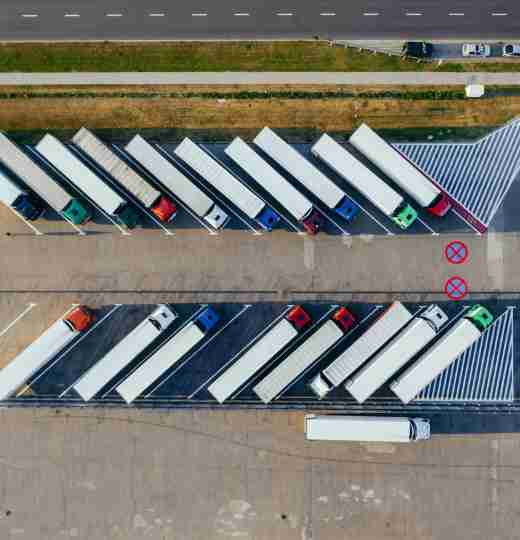A Guide to ISO 27001 for Logistic Companies

For logistics businesses, supply chain security standards need to be taken more seriously than ever due to the frequently advancing nature of cyber threats that could lead to costly breaches and reputational damage.
Logistic companies are particularly at risk as all members of the chain can be affected by a breach if some are not fully security compliant. With increasing reliance on technology in the logistics industry, the need for information security protection has never been higher. This is where ISO 27001 for logistic companies comes in.
In this article, we explain the importance of ISO 27001 for supply chain and logistic businesses.
What is ISO 27001?
Devised by the International Organisation for Standardisation (ISO), ISO 27001 is a globally recognised information security management standard. ISO 27001 was developed to provide companies with a framework for monitoring and protecting any sensitive information held by the business. This framework will help to mitigate any risks that could lead to cyber-attacks or data breaches.
ISO 27001 for logistics companies is comprised of three core components: information management, risk management, and incident management. By establishing policies and procedures to safeguard confidential information, your organisation is also able to frequently review and update these measures according to industry best practices – keeping your security systems completely watertight.
Additionally, ISO 27001 compliance for supply chain companies will also allow your organisation to comply with similar information protection standards, including the General Data Protection Regulation (GDPR).
Why follow ISO 27001 supply chain security standards?
Security risks and threats to the industry are ever evolving, so your organisation must take the necessary precautions to avoid cyber threats and attacks that will negatively impact the integrity of your security system. Your supply chain business should consider the following issues when seeking ISO 27001 for logistic companies:
- Data integrity: Cyber-attackers often target third-party vendors to gain access to any sensitive data. This is why your logistics organisation needs to ensure that all data is held and transmitted securely, maintaining the integrity of data throughout the supply chain.
- Supplier fraud: Supplier fraud is when a hacker impersonates a retailer to request changes to the payment process. Techniques such as AI-generated voicemails, phishing attacks, and Deepfake videos are used to achieve this.
- Shared responsibilities: Shared responsibilities for information security between logistics companies and third-party vendors are common. This increases the risk of security incidents due to the potential for gaps in responsibility and accountability to occur.
- A lack of visibility: Logistics companies may have limited visibility into their third-party vendors' approach to security, such as their practices and policies. This makes it more difficult to assess the level of security the vendor has put in place to protect data.
- Interconnected systems: Similarly, third-party vendors may have access to a company's systems and data, which increases the risk of a security breach in one part of the supply chain that could spread to others.
What are the benefits of ISO 27001 for supply chain businesses?
Although ISO 27001 for logistic companies isn’t mandatory, it’s an extremely useful asset to have for multiple reasons.
When incorporating ISO 27001 for supply chain businesses, your organisation can be much more proactive when it comes to identifying and addressing attacks. Compliance allows your business to systematically detect vulnerabilities, prioritise threats based on severity and monitor and maintain protection controls.
Alongside the obvious security benefits when becoming ISO 27001 compliant, your company will also be at an advantage against competitors without the certification. When choosing a supply chain provider, customers and partners will consider increased security measures as an important factor and compliance will ensure there is a level of confidence and trust in the relationship.
What are the best practices to achieve ISO 27001 for logistic companies?
Achieving ISO 27001 for logistic companies is not a one-and-done process – to remain compliant, your organisation must continue to follow ISO best practices. These include:
- Establishing unassailable security policies and procedures: Measures need to be put in place to protect sensitive information. Your policies must address access controls, data classification, incident management, and more.
- Regularly monitoring and reviewing your security controls: Your organisation should conduct regular penetration testing and risk assessments to ensure that your policies and procedures are up-to-standard in managing risks and protecting sensitive information.
- Conducting staff training: Your entire workforce should be adequately trained in information security. This includes awareness of your organisation’s policies and procedures, risk management, and how to approach these based on their level of responsibility in the business.
- Continuously updating and improving your systems: As security threats are constantly evolving, it’s beneficial to stay proactive when it comes to identifying and addressing new weaknesses, implementing regular updates, investing in new technologies, and staying one step ahead of industry changes and new security threats.
Compliance as you work with Hicomply
Achieving ISO 27001 for logistics companies may take up a lot of your organisation’s time and resources, but the benefits of showing your commitment to information security and protecting customer data are endless. However, it’s entirely possible to receive certification without using precious energy and resources that need to be used in running the business.
At Hicomply, we offer a fully-fledged ISMS solution that will significantly reduce the time frame and cost it takes to achieve compliance, with features that can automate admin tasks, monitor your risk management, and more. Want to know more about how Hicomply can work for you? Book a demo.
Book your demo
Whether you want a complete walkthrough of Hicomply, or just want to chat to our team about your needs — we’re here to help and guide you on your journey to information security compliance.
- Learn how to simplify your certification process
- Discover our built-in automations to improve efficiency
- See how Hicomply can be tailored to your requirements

